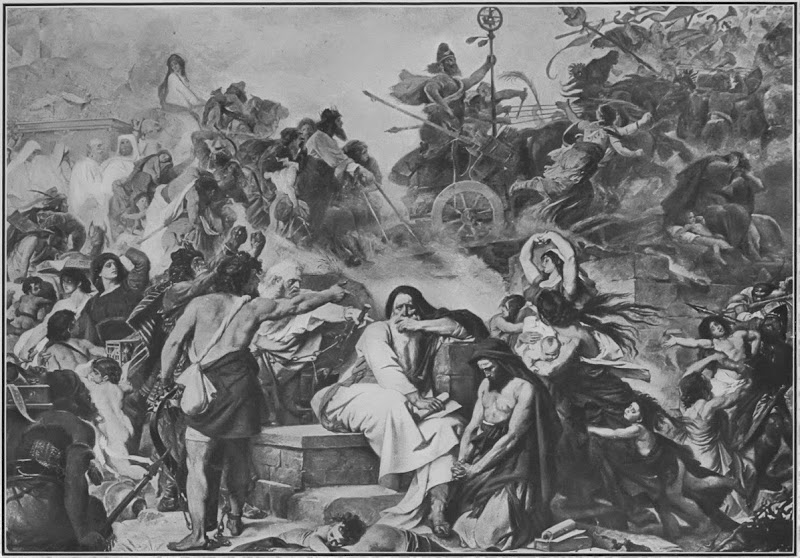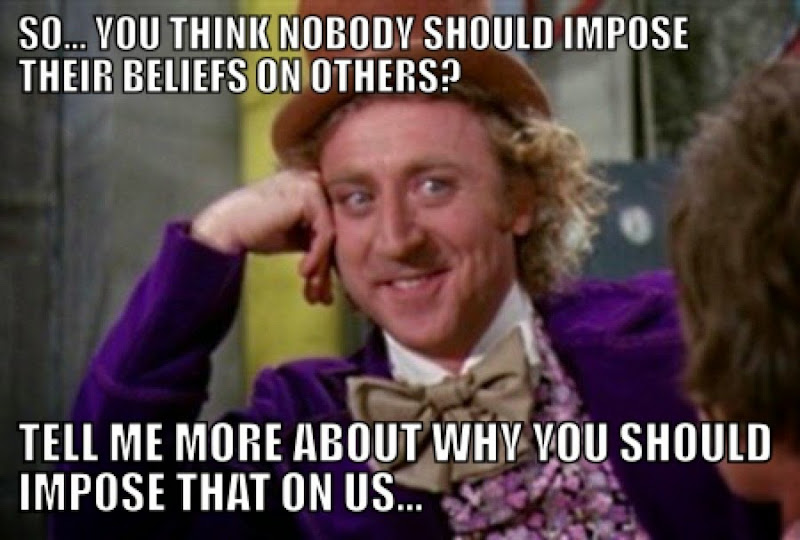Irony: incongruity between the actual result of a sequence of events and the normal or expected result. Also, literary technique, originally used in Greek tragedy, by which the full significance of a character's words or actions are clear to the audience or reader although unknown to the character.
Introduction
As we get closer to the projected release date of the Pope’s encyclical on the environment, a certain group of Catholics is growing more and more hostile to the Holy Father’s teaching authority. At the same time, the same group of Catholics are decrying the decline in the obedience to Church teaching in general. This is a good example of irony in both the standard and classical meanings of the word. It is incongruous to be offended at others being disobedient to the teaching of the Church, while also being disobedient to the Church—one would expect a person concerned with disobedience to be obedient. It is also something they seem to be unaware of doing even though others can see the contradiction plainly.
But the irony is not humorous, but tragic, because this is not something which is outside of one’s control. It is something which one can do something about—by examining one’s own behavior against what is an authority in assessing what is moral and immoral about our behavior. Since, as Catholics, we recognize that humanity is inclined towards sin and that the Church is given the authority to bind and loose by Christ (cf. Matthew 16:19, Matthew 18:18, John 20:21-23), it is reasonable to expect that Our Lord will protect that authority from binding us into error or loosing truth. Once we recognize this, it becomes clear that the teaching authority (as opposed to the comments made which are not teaching—like interviews) of the Church is more trustworthy a guide than our own judgment.
The Replacement of Obedience With “Happening to Agree"
For the longest time, Catholics who identified with being faithful to the Church on how to live, recognized this obligation. When certain Catholics sought to justify disobedience to the moral teaching, the response was to show that this teaching was binding and to disobey Church teaching was to put oneself at odds with Our Lord (cf. Luke 10:16). People took this stand in defending the Church teaching on contraception, abortion, same-sex genital acts and other things. St. John Paul II and Benedict XVI were staunchly defended by Catholics seeking to be faithful.
But it seems that this fidelity was simply because they were in favor of the teaching of the Church anyway. Flashing forward to the pontificate of Pope Francis, we see that many of these defenders of Papal authority are suddenly becoming dissenters. The Pope, experiencing injustices during his life that we in the Western nations can’t imagine, pointed out that the Catholic teaching went beyond the teaching on sexual morality—that we could sin against God and our fellow man through unjust economic situations and political regimes. This isn’t a new situation. The Church has had to stand up against all sorts of oppressive regimes throughout history, and not only against the ones where the rulers committed sexual sins. Our Popes have spoken out on economic injustice on both sides of the capitalist-socialist debates. They recognized that just because one of two factions was condemned outright, it did not mean that the other side was free of flaws. For example, Pope Pius XI, in his encyclical against atheistic communism, Divini Redemptoris, also wrote:
38. It may be said in all truth that the Church, like Christ, goes through the centuries doing good to all. There would be today neither Socialism nor Communism if the rulers of the nations had not scorned the teachings and maternal warnings of the Church. On the bases of liberalism and laicism they wished to build other social edifices which, powerful and imposing as they seemed at first, all too soon revealed the weakness of their foundations, and today are crumbling one after another before our eyes, as everything must crumble that is not grounded on the one corner stone which is Christ Jesus.
In other words, even though socialism and communism were condemned, the Church recognizes that if nations had not neglected their obligations, these errors never would have gotten a foothold in the first place.
Former Defenders Become Dissenters Because the Church is Not What They Want it to Be
Unfortunately, too many people have not taken the Church teaching fully, instead using them in a partisan manner as if a condemnation of one was an endorsement of the other. The result is, when the Church speaks against the problems of the other side, it is presumed that the Church is endorsing what it previously condemned. So, when Pope Francis warns about the abuses in capitalism, people take it as support for socialism. This mindset leads one to forget that there can be more than two options to consider, and that the Church teaching may actually consist in rejecting both options.
The irony of Church defenders turned dissenters appears in another way as well—that the arguments which were used by dissenters against sexual morality are the same arguments that are used to justify dissent against Pope Francis. The arguments which were once rejected are now embraced—because the arguments suit dissent regardless of what the disliked teaching happens to be.
Of course, we need to recognize something. Remember, those dissenters who want to change the Church teaching on sexual morality also deny that the Pope is teaching in a binding manner. The question is, are they justified in their reasons for refusing to obey the Church? If they are not, then neither are dissenters who want to deny the Church teaching on social justice. But if the people who oppose Pope Francis want to justify their dissent, they can’t deny the other dissenters—and that’s exactly the situation which they decried in the 1960s-1990s.
So the defender turned dissenter creates the same problem as the usual dissenter that we had from Church teaching on moral issues. A counter-magisterium is set up which tells the faithful that it is OK to disobey certain things. Whether the dissenter is rejecting the teaching on sexual morality or whether the dissenter is rejecting the teaching on social justice, they are rejecting the authority which Christ gave the Church. While they invoke a greater "truth (whether the liberal invokes [their interpretation of] “compassion” or the conservative invokes [their interpretation of] “tradition”), they are faithless in the smaller things. But Our Lord tells us that “The person who is trustworthy in very small matters is also trustworthy in great ones; and the person who is dishonest in very small matters is also dishonest in great ones (Luke 16:10)."
In other words, there are no cases of “What I do isn’t as bad as what they do.” If a person puts themselves and their preferences above the teaching authority of the Church, they are doing wrong and cannot claim their behavior is compatible with the Catholic faith.
Conclusion: What We’ve Lost Is Obedience
Many Catholics bemoan the fact that the Church was stronger and more respected in past times. They compare it today and try to find a cause to explain it. Vatican II is blamed. Popes are blamed. Bishops are blamed. The charge is, if the Church hadn’t made changes, people would still respect her. But I believe this argument is false. What the Church had in times when she was stronger and respected was obedience. People recognized her as the “barque of Peter” who was tasked with teaching the faith which kept us in right relationship with God. But now, whether the dissent is modernist or traditionalist, obedience is no longer present. It is assumed that the individual knows better than the whole Church, and "if the Church doesn’t teach what *I* want, then I won’t follow what she says!"
But as Catholics, we believe that the Church has the authority to bind and loose (Matthew 16:19 and Matthew 18:18) and to forgive sins or hold them bound (John 20:23). If God gives her that authority and the responsibility to go out to the whole world (Matthew 28:19), it follows that those who become part of that Church have the responsibility to obey what the Church intends to teach (Luke 10:16).
If we reject the teaching of the Church, if we spend time looking for excuses about why we are justified to disobey teachings for which we are required to give assent, we are not faithful Catholics—We are destroying what we claim to defend, just like the old statement “It became necessary to destroy the town to save it.” Some tactics are incompatible with building the Church, and disobedience is one of those incompatible ones.
So let’s be clear about what we are doing and what we are fighting for. If we profess to believe in God and we profess to believe that Jesus Christ established the Catholic Church, then let us carry out that belief by trusting God to protect His Church from teaching error when it to things that require our assent. Then let us show our faith in God’s protection by obeying the magisterium when they teach,









